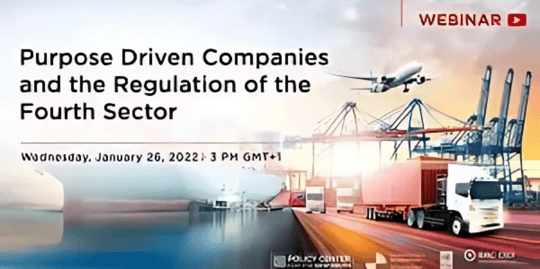Purpose Driven Companies and the Regulation of the Fourth Sector: Morocco Case Study

“The demand for social services is here but the resources are not abundant so the need for socio-economic and ecological change is high, especially in Morocco. Ever since the beginning of this epidemic there has been a reinforcement in the trend that workers who lost their jobs due to the epidemic do not want to go back to purposeless working for a profit-driven company. The time-out that Covid forced on us made us reflect upon our lives. We want our work to have an ulterior meaning. In Morocco, we were able to witness a boom of social entrepreneurs in the last years,“ states Abdelaziz Ait Ali, economist for the Policy Centre of the New South and Ayoub Mamdouh. “There is a new paradigm of capitalism, valuable for the public and thus the best of three worlds; resources, the people, and efficiency.”
I had the opportunity to follow the webinar “Purpose Driven Companies and the Regulation of the Fourth Sector: Morocco Case Study,” which was hosted by Lila Rizk (Manager, Emerging Leaders Unit for the Policy Centre for the New South (PCNS)). The PCNS invited a panel of economists and professionals to discuss the report “Purpose-Driven Companies and the Regulation of the Fourth Sector in Ibero-America.” This report was written by the Policy Center’s Ahmed Ouhnini and Abdelaziz Ait Ali and was academically coordinated by the Atlantic Dialogues Emerging Leaders (ADEL) Alumnus and Peruvian legal scholar Juan Diego Mujica Filippi. It explores the regulatory framework and jurisdiction of purpose-driven companies in Morocco, and the findings of this case study come in a broader vision of creating a public impetus through appropriate policies and regulations for a fairer, more resilient and sustainable business sector.
Our current three-sectoral system is obsolete to the needs of the general public. Regardless of the area you may observe; if it is health, education or the debts that have skyrocketed, the state alone cannot fulfill all of the demands. Especially during the pandemic, nearly every citizen of the planet expected more from the government. Purpose-driven companies would enable everyone to be committed to the change. The state could support this by a legal framework that supports the public interest. (For example, initiatives and tax recognition that support NGOs). “In Morocco, we have 220,000 NGOs and only 200 get tax recognition; every NGO could be supported on some level because it is a troublesome process to get tax recognition.” (Laila Slassi)
Moreover, some NGOs have already used entrepreneurship to attain a sustainable income. For example, the High Atlas Foundation (HAF) furthers human development in Morocco by giving out fruit trees to rural farming communities, thereby creating a sustainable income for Moroccan families. HAF has also empowered and supported women in creating their own cooperatives. They have shown real entrepreneurship and created their own shops where they sell medicine, couscous, carpets, or cookies.
Furthermore, companies would gain from not solely looking for profit but also serving the public interest. A happy customer base means a sustainable income. It preserves not only the customers, by prioritizing their well-being, but also retains the employees’ motivation. The whole dynamic that capitalism has created, taking big risks such as huge debts, would be more thought through.
“The first step is to put purpose at the core of our actions.” (Laila Slassi)